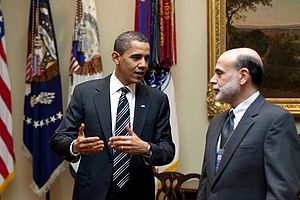Ben Bernanke has gone soft. The chairman of the Federal Reserve said this summer that economics should “understand and promote the enhancement of well-being.” His fellow economists have long worked with an ideal version of rationality to explain the “what” of how our economies function, he argued, while ignoring the irrational foibles of real people trying to grasp the “why” of the world.
I would argue that this is precisely the space in which theology should be speaking into economics. Yet for the most part, it doesn’t seem to be.
In recent years, economists have turned to psychology to better understand the realities of human behavior. While it’s been easy for economists to craft models based on their ideals of rationality, their understanding of humanity has been incomplete. As a result, behavioral economics has begun to influence economic assumptions about the rationality of man and markets in profound ways.

English: President Barack Obama confers with Federal Reserve Chairman Ben Bernanke following their meeting at the White House. (Photo credit: Wikipedia)
Economics traditionally places humanity at the center of its study. Homo economicus roams freely in this area of study in all of his rational, self-centered glory. Birthed by John Stuart Mill, raised in its infancy by David Ricardo, and seen off to college by later economists like Gary Becker, homo economicus formed, in Becker’s words, the “heart of the economic approach to human behavior.”
The rational actor model of human behavior is a rough caricature, but it’s been incredibly useful as a basic assumption. It presupposes that at the micro level, human behavior can be subjected to rigorous examination with consistent outcomes. The broader market can be organized along certain set rules. The results can be tested, modeled, and invested with.
Most of the time, we look and sound pretty rational (or at least I like to think so). Our markets seem to function as they should and efficiently absorb much of the available information. Yet when rationality fails us, it can do so quite spectacularly. Financial crises lurk where logic has long since departed.
Login to read more
Sign in or create a free account to access Subscriber-only content.
Topics:
